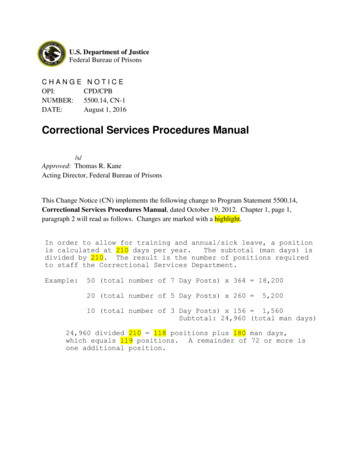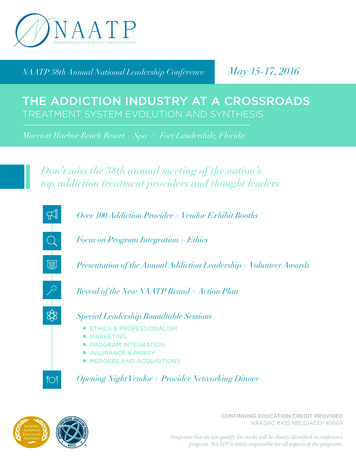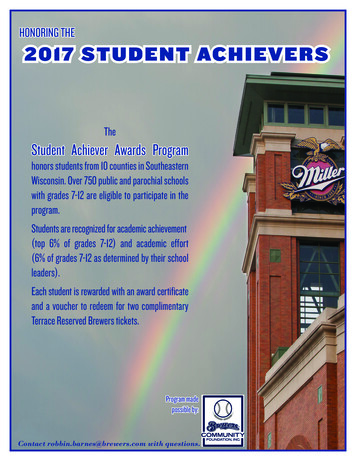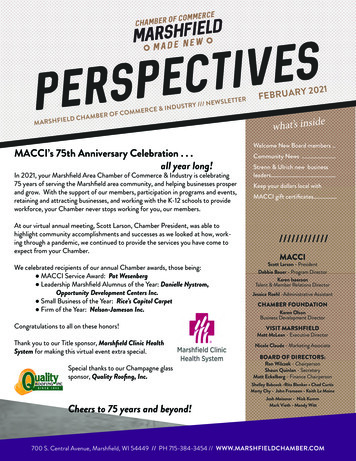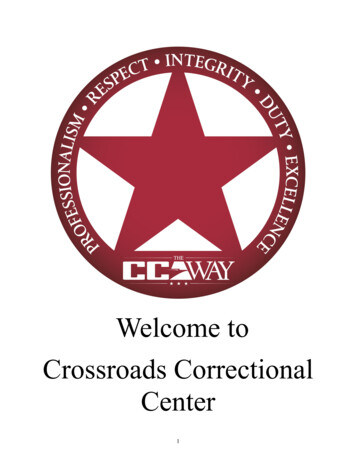
Transcription
Welcome toCrossroads CorrectionalCenter1
Crossroads Correctional Center50 Crossroads DriveShelby, MT 59474406-434-7055Owned and Operated by:Corrections Corporation of America10 Burton Hills BoulevardNashville, Tennessee 37215Contract InformationMontana Department of CorrectionsU.S. Marshals Service2
Crossroads Leadership TeamWarden Douglas Fender joined CCA in 1998 as a cor r ectional officer atNortheast Ohio Correctional Center, and later promoted to senior correctionalofficer. In 2000 Fender transferred as a correctional officer to the Sanders EstesUnit, where he was promoted to assistant shift supervisor then transferring toHardeman County Correctional Center in the same capacity, and later promoting toshift supervisor. In 2005 Fender was promoted to Assistant Chief of Security atMetro-Davidson County Detention Facility, and shortly after was promoted tochief of security at Hernando County Jail, Fender then transferred to GracevilleCorrectional Facility as Chief of Security. In 2011 Fender was promoted toassistant warden at Moore Haven Correctional Facility. In 2013, Warden Fendertransferred to Crossroads Correctional Center as the Assistant Warden and waspromoted to Warden in 2015.Assistant Warden Deborah Powell joined CCA in 1999 as a cor r ectionalofficer at Central Arizona Detention Center (CADC) and was later promoted tounit manager at CADC. Prior to joining CCA, she began her corrections careerwith the Arizona Department of Corrections in 1996. In 2006, she accepted theposition of jail commander with the Pinal County Sheriff’s Office and thenrejoined CCA in 2009 at Red Rock Correctional Center and promoted to unitmanager at La Palma Correctional Center (LPCC) in 2011. In August 2014, sheaccepted the position of chief of unit management at LPCC. Her most currentpromotion has been to Assistant Warden at Crossroads Correctional Center in2015. Ms. Powell is a certified NRA firearms instructor and Samberg FrontlineLeadership facilitator.Chief of Security Raymond Busby joined CCA in 1997 as a correctional officerat North Fork Correctional Facility, serving as a senior correctional officer andassistant shift supervisor. Busby transferred to Crossroads Correctional Center asassistant shift supervisor and shift supervisor. Busby then went to David L. MossCriminal Justice Center as shift supervisor and later became shift supervisor atDiamondback Correctional Facility. In 2007, Busby was promoted to chief ofsecurity at Crossroads Correctional Center. Shortly after being promoted to chiefof security at Crossroads, Busby left the CCA and briefly worked at JeffersonCounty Detention Center as chief of security, before rejoining CCA as chief ofsecurity at North Fork Correctional Facility in 2011. He then transferred in June2014 to Crossroads Correctional Center as chief of security. Prior to joining CCA,Busby served for four years in the U.S. Marine Corps.Chief of Unit Management Domingo Stewart joined CCA in J uly 2007 asFacility Investigator at Tallahatchie County Correctional Facility. and was quicklypromoted to Assistant Chief of Security at that same facility. In November 2012,Stewart was again promoted and transferred to serve in the capacity of Chief ofSecurity at Crossroads Correctional Center. In June of 2014, he took a lateraltransfer and is now the Chief of Unit Management at Crossroads. Prior to joining CCA,he began his career in corrections in 2002 as a Correctional Officer with CornellCorrections in Folkston, GA.3
Crossroads Department Heads and Administrative StaffQuality Assurance ManagerKelly HillHuman Resource ManagerChristine MullerBusiness Manager/PIOCecily SimonsUnit Managers:Cathy ChristiaensCamille WandlerWarden's SecretaryPatti WarburtonChief of Security ClerkLacretia WeatherwaxChief of Unit Management ClerkCasey SmithRecords ClerkWanda LaineTraining ManagerErnest MedowSTG/InvestigatorLeo YorkClassification CoordinatorBrandy SherrardPrincipalGerald KulpasEducation ClerkDarla WinneyHealth Services AdministratorErica SollisRecreation SupervisorEric FinchGrievance CoordinatorWilliam SpiegleMaintenance SupervisorMark VandevanterFood Service ManagerNancy CrowderSafety ManagerLinda ChaneyChaplainJamie StifflerAddictions Treatment Unit ManagerTodd MellingerWarehouse SupervisorSusan Allen/BuchananShift SupervisorsSidney BowmanBrian HodgesBryan JohnsonTom HareJohn WirschingMDOC Contract MonitorKari Kinyon4
History of Crossroads Correctional Center (CCC)In 1997, the fifty-fifth Montana Legislature authorized the Montana Department of Corrections (MDOC) toissue a Request for Proposals and enter into a contract with a private vendor for the construction of acorrectional facility to house State of Montana offenders. MDOC received proposals from five vendors andselected CCA as the successful bidder. Construction of the new 500 bed Crossroads Correction Center beganin late 1998 and the facility started accepting MDOC offenders in September 1999. CCA financed, designed,built and continues to manage the Crossroads facility today. Crossroads achieved and has maintained bothACA (American Correctional Association) accreditation and NCCHC (National Commission on CorrectionalHealth Care) accreditation throughout the years in addition to the state’s oversight of the facility.At the time of activation in 1999, Crossroads Correctional Center began operations with an originaloperational capacity of 512 inmates. Beginning in May 2003, Crossroads also started housing United StatesMarshals Service (USMS) inmates and later expanded capacity to add an additional 96 beds to accommodatethe USMS. CCC continues to house USMS inmates today. In July 2005, Crossroads expanded again byadding an additional 48 bed dormitory, and 54 extra beds October 2014 to serve the Montana Department ofCorrections,. Today, the facility has a total capacity of 711 beds and houses offenders with close, medium,and minimum security custody levels.Crossroads Correctional Center is located in north-central Montana in the community of Shelby. With apopulation of approximately 3,300, Shelby is truly a crossroads for interstate commerce. Interstate Highway15 and a mainline of the Burlington Northern Santa Fe railroads intersect in Shelby. Crossroads CorrectionalCenter is one of the largest employers in the region and currently employs approximately 176 full time andcontract staff from Shelby and surrounding communities. Crossroads generates an annual payroll ofapproximately 6.3 million dollars. It is the largest utility consumer in the region and as private propertycontributes nearly 475,000 per year in local property taxes.Crossroads Mission StatementThe mission and philosophy of Crossroads Correctional Center is to:Protect society and meet judicial and statutor y obligations by ensur ing safe and secur e detention and contr olof all persons ordered into custody;Provide for the health and well-being of all persons in custody in a humane environment which is respectful ofhuman rights and needs; andPrepare per sons in custody for their r etur n to the community as mor e self-supporting, contributing members ofsociety.5
Crossroads Local ImpactEach year, Crossroads Correctional Center contributes the following economic impact to the localcommunity: Annual payroll of 6,599,444 for a staff of 176 from local communities; Approximately 650,000 in utility and use fees; Approximately 475,000 in annual property taxes; and Approximately 160,484 in physician fees to Marias Health Care Center.Staff Involvement In Local CommunitiesWith a staff of approximately 176, Crossroads Correctional professionals are actively engaged in theirlocal communities, a few of which are listed below: Toole County Search and RescueToole County AmbulanceStepping Up 4-HGirl Scouts of AmericaBoy Scouts of AmericaShelby Area Chamber of CommerceAmerican Legion AuxiliaryAF & AM Masonic Lodge, Shelby Lodge #143Shriners International, Inc./Tri-County Shrine ClubKiwanis International, Inc.Rotary International, Inc.Shelby-Toole County Community Transportation Safety CommitteeMarias Medical Center Auxiliary BoardChamber Street Fair Board6
Crossroads Services and ProgramsCrossroads Health ServicesThe Medical Department at Crossroads Correctional Center (CCC) is staffed by contracted and CorrectionsCorporation of America (CCA)-employed professionals. Contracted professionals include: Two Tele-MedPsychiatrists, a Dentist, a Medical Doctor, a Nurse Practitioner, an Optometrist and a Dental Assistant. CCAemployed Medical professionals include: Licensed Clinical Social Worker, Psychologists, Registered Nurses,Licensed Practical Nurses, medical clerks, a part time Dental Hygienist and a Health Services Administrator(HSA) in the Medical Department.CCC pays for all medical, mental health and dental services, including specialty clinics; all medically relatedtransportation, both routine and emergency, and eyeglasses, hearing aids, dentures, and other prosthetics andlimited use equipment for the inmates. The per diem rate per inmate includes infirmary care, medicalobservation, post-operative care, isolation, administration of IV drugs, short term nursing care, suicideobservation, and seclusion for mental disorders and chronic medical housing. Services on site includereasonable health services including medical, psychiatric, dental, vision, pharmaceutical, psychological, andother specialty services and health related services. All these services meet ACA and NCCHC standards,federal and state laws and regulations, and department policies and procedures.Educational OpportunitiesBasic GED and traditional education courses are offered for inmates at CCC. With a GED Test success rate of98.49%, CCC has one of the highest GED Test success rates of all of CCA’s facilities. Once an inmate obtainsa GED, the inmate is eligible to take courses such as Building Maintenance and Food Service Specialist,Mathematics and Advanced Math courses, Art History, English Literature, Introduction to Computers,Information Management Systems, Office 2003, Keyboarding, and Introduction to Psychology,Developmental Psychology, Biology, Health, Life Skills- Parenting and Life Skills, Anger Management,Creative Writing, Public Speaking, US History Parts 1 & 2, Art Basics, Art History for the Western World,Transitional Assistance Programs, Carpentry I-IV, Cabinet Making, Core Carpentry, Library Skills andBusiness Management. Recognition by Defense Activity for Non-Traditional Education Support (DANTES)and College Level Examination Program (CLEP) is also offered for most classes so the inmates can test andapply for college credit. Independent studies are offered that include up to 52 various college level courseopportunities.Today, additional emphasis is being placed on Correctional Education and positive Re-Entry programinteraction to support inmate transitional awareness of the potential hurdles facing them upon release back intosociety. An overall goal of the education Department Programs/opportunities is to decrease/eliminaterecidivism in our prison system.Addictions Treatment UnitThis 60-day program is scheduled for five three-hour groups per week. The program focus is on the 12-Steprecovery process and also offers Cognitive Principals and Restructuring to address criminogenic thinking andbehaviors. Also offered is Anger Management for those recommended to complete that discipline. This groupis open-ended to allow more inmates to participate throughout the course of the year and to enhance aninmate’s opportunities for acceptance into a Pre-release Center or Probation or Parole.7
Crossroads/Canine Companions International Dog ProgramCCC works in partnership with Canine Companions for Independence (CCI) out of Santa Rosa, CA. Thiscompany breeds their own puppies and ships them to us; we then socialize the puppies and begin their training.Our program is financed by the Inmate Welfare Fund. Our dog program started in March, 2006 and we nowhave several CCI dogs with at least 2 inmate dog handlers for each dog participating in the program. The CCIdogs will be at the facility for approximately eighteen months and then they will return to CCI for AdvancedTraining. This program has proven to be beneficial for inmates, staff and for the disabled persons whoultimately receive the dogs. The entire group meets once a week for approximately 2 hours. The CCI dogs aresocialized by staff taking them into the community (nursing homes, churches, grocery stores, hospitals, etc.)Recreation and Hobby ProgramsCrossroads Correctional Center’s Recreation and Hobby Department provides inmates an opportunity toparticipate in approved recreation and hobby activities in an effort to refresh the mind and body and to providean acceptable outlet for stress reduction while maintaining physical fitness and general health. Recreationactivities include: basketball, handball, horseshoes, volleyball, pickle ball, dodge ball, flag football, and softball. Tournaments are also held for the inmates in these sports. We also have a weight room lifting, stationarybikes, elliptical and sprint machines as well as heavy bags and a speed bag for cardio activities. We haveoutdoor recreation which includes a hand ball court, volleyball court, a track and space to play Frisbee andcatch. For soft ball we have an area set aside with a full field and diamond with a back stop.Hobby activities include: In-cell hobbies such as horsehair, beading, art, paper weaving, and needle craft. Wehave a hobby shop in the large gym for leather working to support horsehair and beading, with leather crafttools for our inmates to check out during recreation. Also in the hobby shop is our barber shop. Inmates havethe opportunity to have their hair cut by one of our barbers, or trim their beards during their assigned largegym recreation.Primary Care (Chemical Dependency Program)This Chemical Dependency Program is offered to inmates who have not previously participated in anaddictions treatment program. The main focus is helping the inmates understand the disease; recognize theproblems presented in their lives relating to the disease, and learning how to utilize the 12-steps to recovery.In addition, the inmates are involved in the Cognitive Principals and Restructuring (CP&R) Program. Thisprogram is offered two times weekly and continues for approximately eight weeks. This is a closed-endedgroup wherein a set number of inmates begin and complete the program together. (Scheduled for one, threehour session per week – between eight to ten weeks)Relapse PreventionThis Chemical Dependency Program addresses relapse triggers and traps in order to help the inmate becomemore aware of thinking and behaviors that have culminated in his return to use of drugs and/or alcohol, andincludes a review of the 12-Step Recovery. Cognitive Principals and Restructuring is taught as well as AngerManagement for those required to take it. This group is a closed group that is scheduled for two, 2-hoursessions per week for approximately ten weeks duration.Alcoholics AnonymousAlcoholics Anonymous’ Twelve Steps are a group of principles, which, if practiced as a way of life, can helppromote ways to control the desire to drink and enable participants to re-enter society as healthy, wholecontributors to society. This program is offered to all inmates and is sponsored by Community Volunteers.8
Youth AwarenessThree inmate volunteers host high school tours on a weekly basis to discuss the issues of choices andconsequences. Students are given a tour of the prison facility. Afterward, the inmates engage the students infrank discussions of their lifestyle before entering the prison system. This program serves many studentsfrom surrounding communities.Narcotics AnonymousNarcotics Anonymous’ Twelve Steps, based upon AA’s 12 Steps and expanded to serve those who areaddicted to narcotics, are a group of principles, which, if practiced as a way of life, can help promote ways tocontrol the desire to drink and enable participants to re-enter society as healthy, whole contributors tosociety. This program is offered to all inmates and is sponsored by Community Volunteers.UA Educational ProgramThis is program, comprised of three one-hour video tapes relating to addiction, is for those inmates who havefailed a Urinalysis. The inmates are required to take notes on each video and turn them in to an AddictionsCounselor. When complete, the Addictions Counselor presents the inmate with a letter of completion.Cognitive Principles & RestructuringThis 16 session program is based on Criminal Thinking and Criminal Behaviors and it addresses how toidentify these behaviors and correct them by modifying the person’s thought process. Additionalprogramming takes place in the units that is lead by case managers. Subjects are chosen by the casemanagers and inmates voluntarily attend.Religious ProgramsCrossroads Correction Center employs a fulltime Chaplain that oversees all religious programming andcoordinates all volunteer services for religious activities for inmates. Crossroads provides a Sweat Lodge forNative Americans. Over one hundred volunteers provide a multitude of religious programming which isavailable to all offenders. There are religious support groups and Bible Studies available to every recognizedreligion seven days a week. The chapel continues to expand their video, audio and book library for eachgroup.StepsThe Guide to Self-Sufficiency is designed to build understanding, with a structured process of how anindividuals mind works, and how to control the way of thinking to achieve success- in any part of life. Basedon decades of research in the fields of cognitive psychology, social learning theory, and high achievement,the education presented here stands at the forefront, reflecting the qualities and characteristics of highperformance individuals and organizations.Vividly presenting the concepts and education on video, Lou Tice provides revealing and productive insightsinto both thoughts and actions. The tools and techniques Lou teaches, by easily recognizable stories andexamples, can be applied immediately, to help reach goals easily and enjoyably. Life is propelled out of theordinary and into an exciting adventure.This video presentation by Lou Tice is facilitated by CCC staff certified in this program. The facilitator's roleis to introduce Lou Tice on video, and then stimulate discussion at the conclusion of each unit. Facilitatorstie in the information to personal situations and professional goals and objectives.9
10
11
rejoined CCA in 2009 at Red Rock Correctional Center and promoted to unit manager at La Palma Correctional Center (LPCC) in 2011. In August 2014, she accepted the position of chief of unit management at LPCC. Her most current promotion has been to Assistant Warden at



